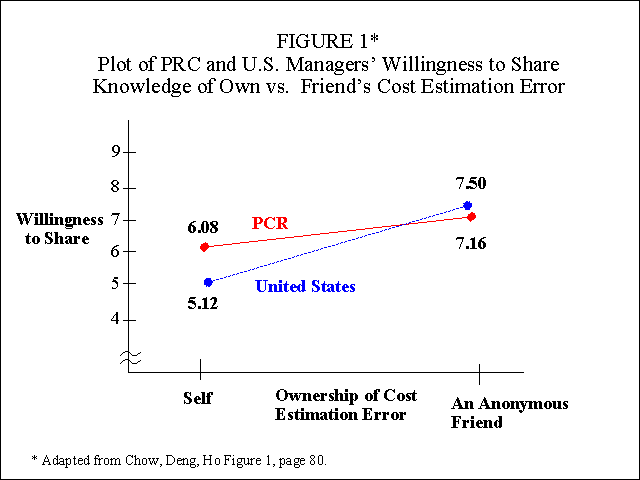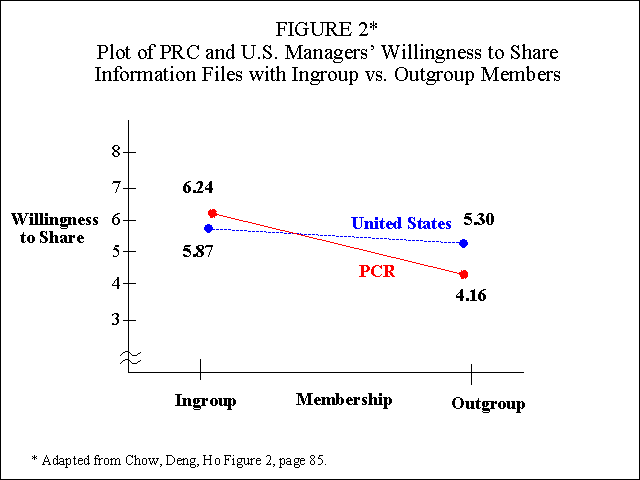
Summary by Mohamed Gomaa
Ph.D. Program in Accounting
University of South Florida, Spring 2002
Knowledge Management Main Page |
Chinese Management Main Page
The main purpose of this article, as stated by the authors, is to describe a study undertaken to advance the understanding of the factors that facilitate or impede knowledge sharing within organizations. The study differs from prior research by focusing on the effects of national culture. This study empirically examines the interaction effects of national culture and contextual factors on employees’ tendency to share knowledge with co-workers.
Researchers suggest that a person’s actions are influenced by national culture either by supplying the values toward which the actions are oriented, or by shaping a repertoire of strategies of actions in which certain patterns of action are facilitated while others are discouraged. Individualism/collectivism is one of the dimensions of national culture that has been identified by several researchers. It is commonly seen as a basic value that distinguishes members of different cultural groups from each other. It relates to the relative emphasis that members of a society place on their self-interest vs. those of other groups. In a collectivist culture, people tend to define themselves in terms of their relationships with others and are more inclined to give up their individual needs when there is a conflict between their needs and group needs. In an individualist society, people tend to define themselves as autonomous entities independent of a group. People in this group tend to be more competitive. People in a collectivist culture tend to share their knowledge placing the interests of the collective over their own. This is influenced by three cultural attributes:
1. Confucian dynamism
Relates to the relative emphasis on long-term consequences or objectives.
2. Concern for face
Can dampen collectivists’ tendency to share some types of knowledge.
3. Ingroup/outgroup distinction in interpersonal relationships
Members of a collectivist culture tend to form ingroups based on friendships.
This study focuses on the U.S. and the People’s Republic of China (PRC) for two reasons:
1. The degree of their divergence on the salient cultural attributes.
2. Both countries’ global economic and political importance.
Hypothesized Differences between PRC and U.S. nationals’ Openness of Knowledge Sharing
H1a: When knowledge sharing does not involve a self vs. collective interests conflict, PRC and U.S. nationals are equally open in knowledge sharing.
H1b: When knowledge sharing involves a self vs. collective interests conflict, PRC nationals share knowledge more openly than do their U.S. counterparts.
H2a: When knowledge sharing involves a self vs. collective interests conflict, PRC nationals share knowledge less openly than do U.S. nationals when the potential recipient is an outgroup member.
H2b: When knowledge sharing involves a self vs. collective interests conflict, PRC nationals share knowledge more openly than do U.S. nationals when the potential recipient is an ingroup member.
Method
The authors used responses from quantitative and open-ended scenarios from 142 managers (104 from the U.S. and 38 from the PRC). The U.S. participants were executive M.B.A. students enrolled in a managerial accounting course at a selective state university. The PRC participants consisted of managers from PRC companies and executive M.B.A. students at a selective PRC university. The experimental design used by the authors’ contained one between-subjects factor (national culture, PRC vs. U.S.) and two within-subject factors (Presence vs. absence of a self vs. collective interest conflict; knowledge recipient’s ingroup vs. outgroup membership).
Summary of Research Findings
Figure 1 shows that when a friend made the cost-estimation error, PRC and U.S. nationals are seen as being equally willing to reveal the error to their organizational colleagues, which is consistent with H1a. PRC employees are seen as being more willing to reveal their own errors than their U.S. counterparts, which is consistent with H1b. Therefore, despite the PRC nationals’ higher concern for face, their greater collectivism and Confucian dynamism still motivated them to reveal their own cost-estimation errors to a greater extent than their U.S. counterparts.

Figure 2 shows that relative to U.S. nationals, PRC nationals were seen as being less willing to share their information files with a co-worker who is not in their group, which is consistent with H2a. This is consistent with the higher rating that PRC managers put on the importance of having a reciprocal interpersonal relationship. However, while the PRC managers indicated a higher level of openness in sharing their information files with their ingroups, the difference was not statistically significant. Therefore, H2b was not supported.

Conclusions
The results obtained by the authors were consistent with culture-based expectations. The quantitative results indicated that Chinese vs. U.S. nationals’ openness of knowledge sharing was related to their different degrees of collectivism as well as whether knowledge sharing involved a conflict between self and collective interest. They also found that Chinese relative to U.S. nationals shared knowledge significantly less with recipients who are not a member of their "ingroup".
_________________________________________________
Related summaries:
Birkett, W. P. 1995. Management accounting and knowledge management. Management Accounting (November): 44-48. (Summary).
Cohen, J. R., L. W. Pant and D. J. Sharp. 1993. Culture-based ethical conflicts confronting multinational accounting firms. Accounting Horizons (September): 1-13. (Note).
Coutu, D. L. 2002. The anxiety of learning. Harvard Business Review (March): 100-107. (Summary).
Davenport, T. H. and J. Glaser. 2002. Just-in-time delivery comes to knowledge management. Harvard Business Review (July): 107-111. (Summary).
Graham, J. L. and N. M. Lam. 2003. The Chinese negotiation. Harvard Business Review (October): 82-91. (How to deal with China. Understand the cultural context of Chinese business style). (Summary).
Ignatius, A. 2021. "Americans don't know how capitalist China is." Harvard Business Review (May/June): 61-63. (Summary).
Mitter, R. and E. Johnson. 2021. What the West gets wrong about China: The fundamental misconceptions. Harvard Business Review (May/June): 42-48. (Summary).
O'Clock, P. and K. Devine. 2003. The role of strategy and culture in the performance evaluation of international strategic business units. Management Accounting Quarterly (Winter): 18-26. (Summary).
Staats, B. R. and D. M. Upton. 2011. Lean knowledge work: The "Toyota" principles can also be effective in operations involving judgment and expertise. Harvard Business Review (October): 100-110. (Summary).